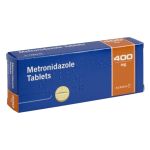Metronidazole is a versatile prescription medication categorized as an antibiotic. However, it goes a step further by possessing antiparasitic properties as well.
the items you wish
to order

by our qualified
prescriber
to your door step
Please use the options provided to make your final selection.

| Brand | Medicine Strength | Size | Price |
|---|---|---|---|
| - | - | 21 tablets | 75.00 |
It looks like you missed filling in questions from the last consultation.Click Here to submit your response.


It is the prescribers duty to ensure that the medicine is being used safely and appropriately. please answer a few questions about yourself to help us process your request.
Customer Service Team
Confidentiality & Authenticity Assured
- Fully Regulated UK Pharmacy
- Authentic UK sourced medicines only.
- Trading for more than 10 years.
- Information Governance lead ensures all data is confidential
Need Help With Your Questionnaire?
Our customer service team is on hand Monday-Friday to help you with your queries.
Please call us on 08009788956 or
email us at: headoffice@pharmacyplanet.com
|
|
|
THIS CONSULTATION IS NOT APPROPRIATE FOR YOUR CONDITION. PLEASE SEEK URGENT MEDICAL ADVICE. |
|
|
|
|
|
|
|
|
|
|
|
|
|
|
|
|
|
|
|
|
|
|
|
|
|
|
|
|
|
|
|
|
|
|
|
|
|
|
|
|
|
|
|
|
|
|
Metronidazole is a broad-spectrum antibiotic. It disrupts the DNA of various bacteria and parasites, hindering their growth and reproduction. This makes it effective against a wider range of infectious agents.
Metronidazole tackles a diverse array of conditions, including:
Bacterial infections:
H. pylori ulcers: It joins forces with other antibiotics to eradicate this bacterium responsible for peptic ulcers.
Gut infections: It combats bacterial diarrhoea caused by Clostridium difficile (C. Diff) and other bacteria.
Periodontal disease: It fights against bacteria involved in gum inflammation and infections.
Parasitic infections:
Trichomoniasis: This common sexually transmitted infection caused by a parasite is effectively treated with metronidazole.
Giardiasis: This intestinal parasitic infection is another target for metronidazole.
Amoebiasis: This parasitic infection can cause intestinal discomfort and dysentery. Metronidazole can eradicate the parasite and treat the infection.
Important Considerations:
Not for Viruses: Metronidazole is ineffective against viral infections. Antibiotics do not work for against viruses.
Alcohol Interaction: A significant drawback is its interaction with alcohol. Consuming alcohol while taking metronidazole can cause unpleasant side effects like nausea, vomiting, and stomach cramps. It's recommended to avoid alcohol consumption during treatment and for a brief period afterward.
Dosage and Administration
Metronidazole comes in various forms like tablets, capsules, liquids, and topical gels/creams. The dosage and duration depend on the specific infection and its severity. It's crucial to follow your doctor's instructions precisely and complete the entire course to ensure complete eradication of the infection.
Potential Side Effects
Common side effects include:
- Metallic taste in the mouth
- Nausea, vomiting, and diarrhoea
- Headache
Precautions
Pregnancy and breastfeeding: Consult your doctor before taking metronidazole if you are pregnant or breastfeeding.
Underlying conditions: Inform your doctor about any pre-existing medical conditions, especially liver or nervous system issues.
Metronidazole is a powerful medication for various bacterial and parasitic infections. However, responsible use under a doctor's supervision is vital to maximize its benefits and minimize side effects. Remember, antibiotics won't fight viruses, and completing the prescribed course is essential for successful treatment.
People also ask
What is Metronidazole?
Metronidazole is a prescription medication classified as a nitroimidazole antibiotic. Unlike many antibiotics that target a broad spectrum of bacteria, Metronidazole has a specific niche. It's particularly effective against anaerobic bacteria, which are organisms that can thrive in environments lacking oxygen. These bacteria are often found in the body, including the gut, mouth, and reproductive organs. Metronidazole disrupts their essential functions, hindering their growth and reproduction, ultimately leading to their demise. This targeted action makes Metronidazole a valuable tool for treating a variety of infections caused by these anaerobic troublemakers.
How does it work?
Metronidazole's mechanism of action is distinct from many traditional antibiotics. Instead of directly attacking the bacteria's cell wall (a common strategy), Metronidazole disrupts the bacteria's DNA. This DNA is the blueprint for the bacteria's survival and reproduction. By interfering with its structure and function, Metronidazole throws a wrench into the bacteria's ability to grow and multiply. This weakened state makes them vulnerable to the body's immune system, allowing white blood cells to effectively eliminate the infection.
What are the benefits of taking it?
Metronidazole's unique ability to combat anaerobic bacteria makes it a versatile weapon against a range of infections. Here are some of the common conditions Metronidazole can help treat:
- Bacterial Vaginosis and Trichomoniasis: These are common infections of the female reproductive system caused by anaerobic bacteria and parasites, respectively. Metronidazole effectively eliminates these organisms, restoring balance to the vaginal flora.
- H. pylori Eradication: This bacterium is a major culprit in peptic ulcers, causing inflammation and stomach discomfort. Metronidazole is often used in combination with other medications to eradicate H. pylori and promote ulcer healing.
- Gum Disease: Periodontal infections involve the inflammation of gum tissue and can lead to bone loss around the teeth. Metronidazole can be used alongside other treatments to combat the anaerobic bacteria contributing to gum disease.
- Severe Acne: In some cases, stubborn acne can be linked to the presence of certain bacteria. Metronidazole, with its ability to target these bacteria, can be a helpful addition to an acne treatment regimen.
- Parasitic Infections: Metronidazole also proves effective against some parasitic infections like amoebic dysentery, a diarrheal illness caused by a specific parasite, and giardiasis, an intestinal infection.
- Preventative Use: In certain situations, such as before surgeries involving the colon or intestines, Metronidazole may be used preventatively to minimize the risk of post-surgical infections caused by anaerobic bacteria.
How do I use it and its dosage?
Metronidazole comes in various forms to suit different needs. You might encounter tablets, capsules, a liquid suspension for easier swallowing, or even a topical gel for specific skin conditions. The doctor will determine the most suitable form and dosage based on the type of infection and your individual situation. It's critically important to adhere strictly to the doctor's instructions regarding dosage, frequency, and duration of treatment. Here are some general points to remember:
- Dosage: The prescribed dosage can vary depending on the specific infection and your age. It's typically taken one to three times a day.
- Duration: Treatment can range from a few days for a simple infection to several weeks for more complex cases.
- Always Complete the Course: Even if you start feeling better before finishing the medication, it's crucial to complete the entire prescribed course. This ensures the complete eradication of the infection and minimizes the risk of antibiotic resistance developing in the bacteria.
Side effects & precautions
While Metronidazole is generally well-tolerated, some side effects can occur. Here are some of the more common ones:
- Metallic Taste: A metallic taste in the mouth is a frequent side effect associated with Metronidazole.
- Digestive Issues: Nausea, vomiting, and diarrhea can occur. Taking the medication with food can help minimize these digestive discomforts.
- Stomach Cramps: Abdominal cramps may also be experienced by some users.
- Headache and Dizziness: Headaches and dizziness are potential side effects, so be cautious when driving or operating machinery if you experience these.
- Yeast Infections: Disruption of the natural gut flora by Metronidazole can sometimes lead to the development of yeast infections (candidiasis or thrush).
Precautions:
- Inform Your Doctor: Before starting Metronidazole, it's vital to disclose any allergies you may have, particularly to Metronidazole or other medications.
- Pre-Existing Medical Conditions: Let your doctor know about any pre-existing medical conditions, especially liver disease, epilepsy, or nervous system disorders. These conditions may require










